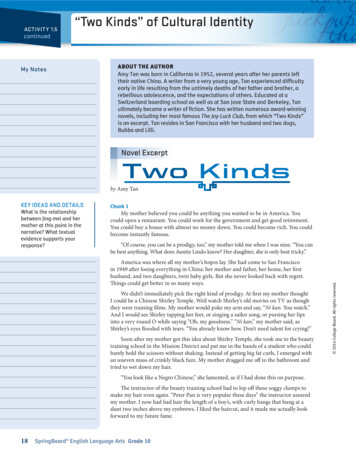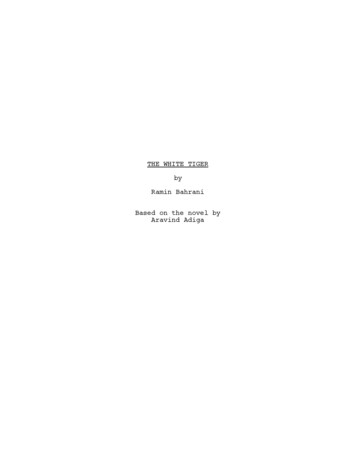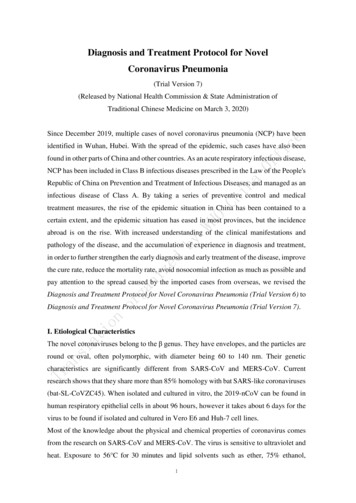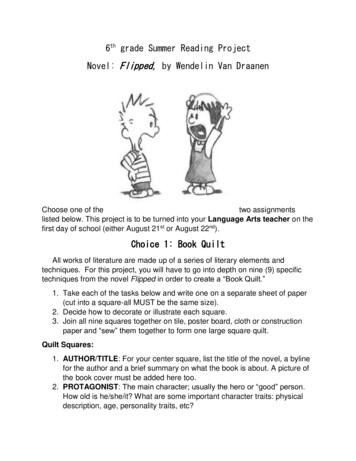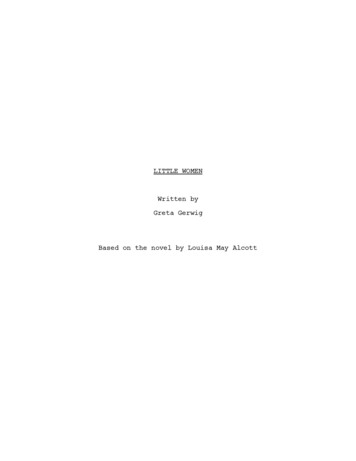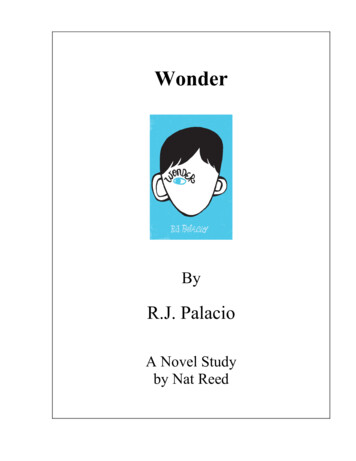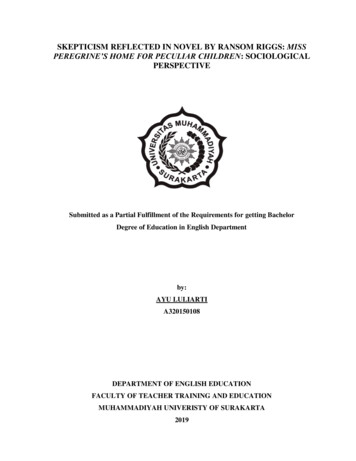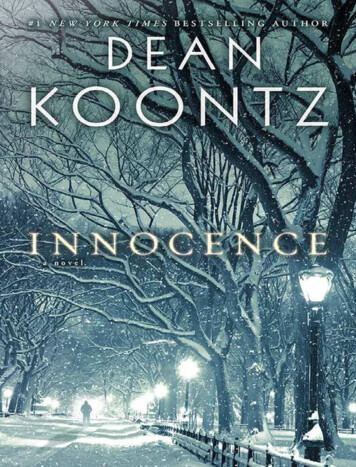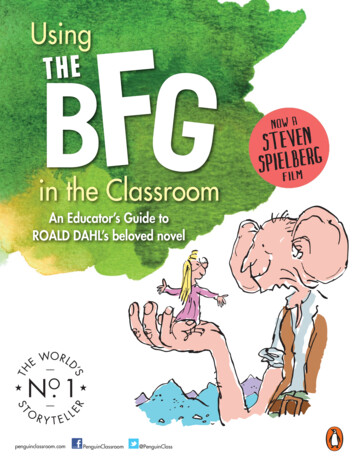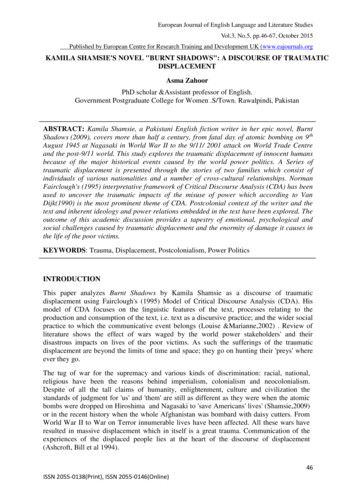
Transcription
European Journal of English Language and Literature StudiesVol.3, No.5, pp.46-67, October 2015Published by European Centre for Research Training and Development UK (www.eajournals.orgKAMILA SHAMSIE'S NOVEL "BURNT SHADOWS": A DISCOURSE OF TRAUMATICDISPLACEMENTAsma ZahoorPhD scholar &Assistant professor of English.Government Postgraduate College for Women .S/Town. Rawalpindi, PakistanABSTRACT: Kamila Shamsie, a Pakistani English fiction writer in her epic novel, BurntShadows (2009), covers more than half a century, from fatal day of atomic bombing on 9thAugust 1945 at Nagasaki in World War II to the 9/11/ 2001 attack on World Trade Centreand the post-9/11 world. This study explores the traumatic displacement of innocent humansbecause of the major historical events caused by the world power politics. A Series oftraumatic displacement is presented through the stories of two families which consist ofindividuals of various nationalities and a number of cross-cultural relationships. NormanFairclough's (1995) interpretative framework of Critical Discourse Analysis (CDA) has beenused to uncover the traumatic impacts of the misuse of power which according to VanDijk(1990) is the most prominent theme of CDA. Postcolonial context of the writer and thetext and inherent ideology and power relations embedded in the text have been explored. Theoutcome of this academic discussion provides a tapestry of emotional, psychological andsocial challenges caused by traumatic displacement and the enormity of damage it causes inthe life of the poor victims.KEYWORDS: Trauma, Displacement, Postcolonialism, Power PoliticsINTRODUCTIONThis paper analyzes Burnt Shadows by Kamila Shamsie as a discourse of traumaticdisplacement using Fairclough's (1995) Model of Critical Discourse Analysis (CDA). Hismodel of CDA focuses on the linguistic features of the text, processes relating to theproduction and consumption of the text, i.e. text as a discursive practice; and the wider socialpractice to which the communicative event belongs (Louise &Marianne,2002) . Review ofliterature shows the effect of wars waged by the world power stakeholders' and theirdisastrous impacts on lives of the poor victims. As such the sufferings of the traumaticdisplacement are beyond the limits of time and space; they go on hunting their 'preys' whereever they go.The tug of war for the supremacy and various kinds of discrimination: racial, national,religious have been the reasons behind imperialism, colonialism and neocolonialism.Despite of all the tall claims of humanity, enlightenment, culture and civilization thestandards of judgment for 'us' and 'them' are still as different as they were when the atomicbombs were dropped on Hiroshima and Nagasaki to 'save Americans' lives' (Shamsie,2009)or in the recent history when the whole Afghanistan was bombard with daisy cutters. FromWorld War II to War on Terror innumerable lives have been affected. All these wars haveresulted in massive displacement which in itself is a great trauma. Communication of theexperiences of the displaced people lies at the heart of the discourse of displacement(Ashcroft, Bill et al 1994).46ISSN 2055-0138(Print), ISSN 2055-0146(Online)
European Journal of English Language and Literature StudiesVol.3, No.5, pp.46-67, October 2015Published by European Centre for Research Training and Development UK (www.eajournals.orgBurnt Shadows, Kamila Shamsie's fifth novel, is a discourse of traumatic displacement. Itbegins with the presentation of an unnamed captive, unshackled and stripped naked inreadiness for the anonymity of an orange jumpsuit, he wonders: "How did it come tothis?"(Shamsie, 2009 p 1) The vastness of the question as applied to a prisoner inGuantánamo Bay is a challenge to which this epic, yet skillfully controlled novel rises inoblique and unexpected way (Jaggi, 2009).REVIEW OF LITERATUREPotter (2009) writes in her review,' Burnt Shadows is a giant of novel, striding purposefullyacross Japan, India, Turkey, Pakistan, Afghanistan and America. The characters arecountless, the language myriad, the time frame huge in which Shamsie has managed torelease the post-9/11 novel from its self-imposed small canvas of the post 9/11 era only.'The four sections of the novel present the shared histories of two families, from the fataldropping of atomic bomb on Nagasaki in Japan in World War II, India immediately beforePartition in 1947, to Pakistan in the early 1980s, New York after 9/11 and Afghanistan in theresultant war on terror.(See,2009)War on Terror provided a license to the only super power of to justify that might is the onlyright. The detention facilities of United States at Guantanamo Bay, Cuba, have becomerepresentative of the gross human rights abuses perpetrated by the U.S. Government in thename of fighting terrorism. (“Guantanamo-Amnesty International”)After 9/11 this selfacquired license of the only super power to hunt, chase, detain and kill has been usedunscrouplessly. At Guantanamo, the U.S. government keeps the detainees in a place whereneither U.S. nor international law is allowed to enter. This is exactly in keeping with thejustification of the American doctor about dropping the atomic bomb, 'to save the Americans'lives.' In the philosophy of power nothing has changed.Prakash (2012) is of the opinion that the physical threat to life is the strongest factor thatcauses displacement but what Shamsie portrays in the novel as a cause of displacement ofHiroko was the fear of being identified with the fatal bomb that destroyed her whole familiarworld. She survived but in Japan she was regarded as 'hibikusha' and she hated this identity.But her son Raza final series of traumatic displacement was because of threat to life.Herhusband's displacement was rather forced displacement on account of Partition whileAbdullah, Raza's Afghan had to be displaced time and again for war, survival, defense andlife.Shaw (2013) does not regards war as a solution, rather he considers the result of 'the war wasa victory of one set of genocidal polices and actors over another, not of anti-genocide overgenocide'. But from World War I and II to the war on terror the actors and the policies haveremained the same, variety is observed only in the settings and the victims. Smith (2007) is ofthe opinion that displacement does not occur only in the physical world, but it affects thewhole being of the displaced .It has social, psychological and emotional implications.Ashcroft et al (1989) emphasize the fact that the term place is not merely synonymous withlandscape rather it goes with familiarity, identity and belonging. This is what makes Hirokobitterly in Mussoori and makes Raza longs for 'home' not for the luxury of Miami's apartmentbut for Karachie.Smith (2007) opines that, "Displacement, then, is not simply an external,47ISSN 2055-0138(Print), ISSN 2055-0146(Online)
European Journal of English Language and Literature StudiesVol.3, No.5, pp.46-67, October 2015Published by European Centre for Research Training and Development UK (www.eajournals.orggeopolitical phenomenon." Rather, it remains an internal process where the refugee or exilefinds his/her humanity cast out from its own sense of culture and history, even at times, fromthe very language "in which it has been constituted (p. 10)'' .In recent history displacementon account of war has been a continuous and common phenomenon. It is especially true ofthe people from those nations and states which are made the battle ground for the worldpower stake-holders. Kamila Shamsie, a neocolonial writer, is from an ex-colony which gotindependence in 1947 but has been a battle ground ever since for the world power stakeholders. Burnt Shadows in a way is a rebuttal of the grand narratives created and propagatedby the world powerful media in the name of terrorism. She represented the other side of thedivide of 'us' and 'them'. The fate of the victims of the World War II or the victims of the Waron Terror remain the same for they are not among those, 'who are more equal thanothers'(Orwell, 1945)METHODOLOGYIn order to explore Burnt Shadows as a discourse of traumatic displacement I will explore thetext to look for the relevant details in the novel and apply Fairclough's model of CriticalDiscourse Analysis (CDA). Fairclough's approach to CDA is based upon the assumption thatlanguage is an irreducible part of social life, dialectically interconnected with other elementsof social life, so that social analysis and research always has to take account of language(Fairclough, 2003 p.2).Fairclough's approach to discourse analysis focuses upon the language of texts as well as it isalso concerned with what happens in particular texts. The link between these two concerns ismade through the way in which texts are analysed in CDA. Text analysis is seen not merelythe linguistic analysis; it also includes what Fairclough has termed as interdiscursiveanalysis' (Fairclough, 2003 p.3).Fairclough focuses on social effects of texts and regards texts as elements of social eventswhich have causal effects — i.e. they bring about changes. Most immediately, texts can bringabout changes in our knowledge, our beliefs, our attitudes, values and so forth. Contemporarysocial science has been widely influenced by social constructivism' — it claims that thesocial world is socially constructed. One of the causal effects of texts which has been ofmajor concern for CDA is ideological effects — the effects of texts in inculcating andsustaining or changing ideologies (Eagleton 1991, Larrain 1979, Thompson 1984, Van Dijk1998 as quoted in Fairclough,2003). Ideologies are representations of aspects of the worldwhich can be shown to contribute to establishing, maintaining and changing social relationsof power, domination and exploitation. A published text, according to Fairclough, can figurein many different processes of meaning-making and contribute to diverse meanings, becauseit is open to diverse interpretations. Fairclough says what we are able to see of the actuality ofa text depends upon the perspective from which we approach it, including the particularsocial issues in focus.(2003)My focus in this paper is on analysing Burnt Shadows as a discourse of traumaticdisplacement drawing upon Fairclough's theory of critical discourse analysis. This analysisencompasses the production, reception and interpretation of the text. To assess the causal andideological effects of the text, I will try to link the micro' analysis of the text to the macro'48ISSN 2055-0138(Print), ISSN 2055-0146(Online)
European Journal of English Language and Literature StudiesVol.3, No.5, pp.46-67, October 2015Published by European Centre for Research Training and Development UK (www.eajournals.organalysis of it as a social practice and try to explore how Shamsie has brought the outside'world into the text and to what effect.The next section is based on the analysis of Kamila Shamsie's novel Burnt Shadows as adiscourse of traumatic displacement. The whole story revolves around the displacement ofdifferent characters but for this paper I have delimited my study to Raza's character as arepresentation from the colonized world.ANALYSISTextual AnalysisIn the prologue of Burnt Shadows Shamsie depicts a prisoner in Guantanamo Bay, to showthe height of traumatic displacement of someone who was even deprived of humanity. Theprologue goes like this:‘Once he is in the cell they unshackle him and instruct him to a strip. He takes offhis grey winter coat with brisk efficiency and then –as they watch, arms foldedhis movement slow, fear turning his fingers clumsy on belt buckle, shirt buttons.They wait until he is completely naked before they gather up his clothes andleave. When he is dressed again, he suspects, he will be wearing an orange jumpsuit.The cold glean of the steel bench makes his body shrivel. As long as it's possible,he will stand.How did it come to this he wondered?’(1)The depiction in the prologue is the end of Raza's story, the actual history of traumaticdisplacement starts from his mother, Hiroko Tanaka, a Japanese school teacher fromNagasaki and a direct victim of atomic explosion on 5th August 1945 in World War II. Shelost her father, fiancé and a whole familiar world in that blast. She heard the American'sjustification for that whole sale destruction that the dropping of bomb was necessary 'to savethe Americans' lives.' So she left that world behind. The other strong reason for herdisplacement was the 'bomb' which became her defining feature after falling a victim to it,there she was termed as 'hibuksha'—the atomic explosion survivor. So she moved to Indiawhere the half-sister of her dead German fiancé lived. There she met Sajjad, an IndianMuslim from Delhi and they got married. They had to migrate to Pakistan because ofPartition and got settled in Karachi. There Raza was born as a normal child, inheriting hismother's feature and love for languages.Raza never spoke Japanese in thinking, ‘Why allow the world to know his mind containedwords from a country he'd never visited? Weren't his eyes and his bone structure and hisbare-legged mother distancing factors enough?’ (139) He had to adapt himself to fit in, in hissurroundings by ‘downplaying his manifest difference.’ (139) He was a born Pakistani but theorigin of his mother and the tragedy she had suffered from always made him struggle toensure his placement with conscious efforts.49ISSN 2055-0138(Print), ISSN 2055-0146(Online)
European Journal of English Language and Literature StudiesVol.3, No.5, pp.46-67, October 2015Published by European Centre for Research Training and Development UK (www.eajournals.orgRaza was a brilliant child and his parents were sure of his success after which he would studylaw to fulfill his father's dreams. But then after the exams he started behaving strangely andfailed in Islamic studies telling his mother he couldn't attempt the paper. She consoled himand asked Sajjad to be considerate. But somehow the problem persisted. Then, Harry, the sonof Burtons' came in his life. One day they went to the beach along with Harry early in themorning, there Raza got acquainted with an Afghan boy Abdullah, he introduced himself asan Afghan and told him that he would see him at Sohrab Goth. He was asked who his peoplewere and Raza confidently replied Hazara. This association and false identity would providean escape to Raza from his failure in exams and love and give him confidence to confront lifebut would lead to his family's disintegration and another series of displacement.Raza cherished the idea of being at an American university and shared it with the girl heloved and asked her,' .marry me and we'll go to America together.’ She replied,' Raza, myparents will never let me marry you' She went on,' It's because of your mother .Everyoneknows about your mother.'(188-89)' What about her?' he asked and the reply was,' Nagasaki.The bomb .No one will give their daughter to you in marriage unless they're desperate'. Shewent on,' You could be deformed ' Poor Raza protested he was not, Salma's father was hisdoctor and he knew that Raza was not.' He tried to defend himself by saying,' I've never beento Nagasaki. I was born twenty years after the bomb.' Deeply hurt he told her if she didn'twant to talk to him anymore, it was ' OK But don't say this .Don't say you think I'mdeformed. 'The cruel response was,' You need to know. This is how people think about you.Go to America And don’t tell anyone there the truth.' She bade goodbye with the requestnever to be called again (189).All this created an emotional displacement which was a greattrauma in itself.Raza was disturbed and distracted beyond measures but .'he realized he had been waiting along time for confirmation that he was' not an outsider' for ' he'd lived in this moholla hiswhole life' but 'just a tangent. In contact with the world of his moholla, but not intersecting it from intersecting world Raza Konrad Ashraf was cast out '(189).This confirmation createda mental displacement which was traumatic for Raza beyond measures.He remembered how once when he and Altamash were coming together after Jumma prayersBilal asked the rickshaw driver to guess which of the two boys was not Pakistani .It was anentertainment for Bilal but not funny for Altamash and Raza who was'trying to understandwhy such injustices should be seen as humour.'(190) 'He had never known until Salma'srefusal 'what it was in Bilal's game that had upset him so much '. But in that moment, ' unableto duck the knowledge that more than anything else Salma pitied him, it was inescapable: hedidn't fit this neighbourhood.’ (191)While wandering in despair and absentmindedly looking at the boys who were now inprofessional colleges he thought,' You could be a bomb-marked mongrel or a failure but notboth And then he thought of America,' .Yes he'd go there. Uncle Harry would make ithappen. None of the rest of this mattered while he had the promise of America'(191) .Butwhen he mentioned it in front of his father, he got furious and Harry also refused havingmade any such promise. The agony of the dream that had gone sour weighing heavy onRaza's nerves so he gathered all his money and went to Soharab Goth for shopping withoutknowing that this escape would lead to irreparable loss of his ‘home’ and his father.So he entered another world, Abdullah instantly recognized him as 'Raza Hazara' and hedidn't refute but when he asked further questions he pretended that he couldn't tell anything50ISSN 2055-0138(Print), ISSN 2055-0146(Online)
European Journal of English Language and Literature StudiesVol.3, No.5, pp.46-67, October 2015Published by European Centre for Research Training and Development UK (www.eajournals.orgabout his life because he had taken an oath when his father got killed by the Soviets that hewould not tell anything about himself until the day the last Soviet would leave Afghanistan.He added, ‘And I will be the one to drive out that last Soviet' (197-98).The Soharab Goth hecame to visit was a refuge of the displaced.Abdullah tightened his grip to show his bond with Raza and said,' We may fight over whichone of us gets to drive out that last Soviet. But until that fight, we're brothers.' Raza askedAbdullah to help him buy something who thought he was looking for arms and came out withAK-47 and told him how to hold, use and dismantle it. Raza Hazara moved his hand along it'squealing in terrified delight'. Abdullah put it back and said if Raza would tell him what hewas doing with the American. In reply he said,' I cannot tell you what I was doing with theAmerican But there are ways of driving out Soviets without directly handingKalashnikovs. I hope you see what I mean.' Abdullah seemed impressed; he asked whetherthat American speak Pashto. Raza replied just a little and added that they mostly talked inEnglish. Abdullah asked Raza to teach him English. 'You teach me, and I'll give you one ofthese free of charge. No one notices if one or two go missing. The next shipment, I'll get youone.'(200)Hiroko didn’t know what Raza’s activities were. She was only relieved to know that he tookthe exams well and was not planning to leave the country. He told her that he had made newfriends and he was happy (206). Raza had been living two lives, one as a failure, as an exfactory worker, and a bomb- monger and the other as Raza Hazara, an English teacher and anorphan who had vowed to send the last Russian soldier out of Afghanistan. The apparentthrill of the dual existence was actually an escape from his own world where he was notjudged by his own merits but was regarded as an alien for the remote origin and victimizationof her mother on which she had no control. This escape was 'exhilarating', and 'thrilling' but 'wearing’ at the same time (207). And he knew this pretension couldn't last forever.This exposure to another world to which he didn't belong helped him lessen his anxiety in astrange way. , 'But he knew there was no living in two worlds, not for any length of time.'And the day he walked out of the examination hall, knowing he'd performed to excellence, 'itwas entirely obvious which world he was going to give up.’ He thought, ‘Who choosesborrowed dreams over the dreams they've grown up with? '(208). But he felt a great burst ofaffection towards Abdullah, who had made possible the life of Raza Hazara which haddiverted Raza and gave him confidence. He went to see Abdullah after he had passed theexamination with a few days gap with the feeling,' And the time for choosing one life overthe other suddenly seemed to be at hand.' Abdullah took him to an open eating place .Theywere silent. Raza asked him the reason for his quietness and he told that he was fourteen andhis brothers had promised that when he would be fourteen he could go to one of the trainingcamps (210).He told that the following week he would be going with Afridi to his brother who would takehim to the training camp. He reminded Raza who had said that' there were other ways to fightthe Soviets' but Raza was in a different state of mind now, he took it as an opportunity to partways. '(210) Raza had heard a lot from Abdullah how he used to travel in truck throughoutPakistan,'lying at night in the open-top container watching the stars . No parents to say whatwas and wasn't allowed, just the open road, the shifting landscape, the trilling knowledge ofgun-running.' Here it was Raza thought the ‘chance to bring the friendship of Raza Hazaraand Abdullah to a close in a manner that it deserved, in a burst of adventure andcamaraderie.’ So he told Abdullah,'Next week you and I will go to Peshawar together.'51ISSN 2055-0138(Print), ISSN 2055-0146(Online)
European Journal of English Language and Literature StudiesVol.3, No.5, pp.46-67, October 2015Published by European Centre for Research Training and Development UK (www.eajournals.orgAbdullah stared at him and asked, 'You'll come to the training camps with me?' And the replywas, 'Why not?' He added, 'A true Afghan doesn't waste time with the CIA. He attacks theSoviets directly. I've learnt this from you." Abdullah smiled his broad, joyful smile. 'You andme together. The Soviets won't stand the chance."(211)And so a little over week later, Raza was in a truck heading from Karachi to Peshawar. Therewas much he leant during this travel for example,' he learnt, through absence the luxurieshe'd taken for granted; he learnt most of all that he would miss Abdullah's friendship.'(212)But till then he didn’t have a realization how this escape would impact and condition the restof his life. So he went on reminding himself silently of his plan ‘ to accompany Abdullah toPeshawar and then vanish.'(213)The very thought of leaving Abdullah and Afridi made him sad. Though he was determinedto leave Abdullah and the world associated with him but there was conflict going in his mind,he tried to satisfy himself by thinking he had ‘no commitment’ (213).He found himself in avalley of mud and pebbles. He looked up at the mountain and thought 'If you're bigenough it doesn't matter what you are made of.' He stepped on to the side of the road,’ feeling he was on a barren planet where any mythological creature might be lurking'. He felthimself out of place. When he turned back towards the truck, he saw Afridi leaning out fromthe driver's seat, clasping Abdullah's hand .Then the older man raised a hand in Raza'sdirection. He said to them, ’Look after each other. And don't fight over that last Soviet.' Razagot bewildered, 'What? No, wait. ' But his voice was lost in the wilderness the truck went offleaving Raza and Abdullah in the middle of 'the vast emptiness.' Raza asked Abdullah,‘Where did he go?' Abdullah looked at him in surprise and replied, ‘To Peshawar, of course.My brother's going to meet us near here .Come we have to walk a little.' In a state of shockRaza looked down at his feet. There seemed to be heavy weights attached to them. It wasclear he couldn't move.Abdullah asked him to come on .They walked along the narrowing dirt road throughnothingness for what seemed hours, the mountain providing no shadow at this time of day toprotect against the harsh sun an then ' on a low range of mountain, stretching on foreverRaza found a tents city of refugees. Abdullah told Raza in a voice quieter, more grave than hehad ever heard before,' It doubles in size every time I come back.' Raza said he wanted to seethe refugee camp. Abdullah sharply asked, 'What do you want to see?' 'People living likeanimals?' These places are the enemies of dignity. It's good, it's good that we should livethere, like that."(215) Raza wanted to know how that was good. Abdullah replied as if hewas confessing the worst of crimes that he was forgetting when he went to Karachi and sawits light and promise the boys who grew up in the camps never forgot. He had a feeling thatif all looked around and knew the outside world they might consider other options,' thatmust mean our homeland now is the doorway to hell. And we must restore it to Paradise.'Then he turned to Raza and said with the expression and tone of an adult, ‘Thank youbrother.' Looking from the camps to Abdullah for the first time Raza ‘saw the smallness ofhis own heart, the total self-absorption.’ And the same Raza who had rather provokedAbdullah when he was discussing the option of staying at Karachi to continue working withthe supply line now took a different stance by telling him that he had been right, he shouldcontinue working with Afridi and supply line for those who were there in the camps neededarms to fight with, 'The camps are no good without guns for the mujahedeen to fightwith.'(216)52ISSN 2055-0138(Print), ISSN 2055-0146(Online)
European Journal of English Language and Literature StudiesVol.3, No.5, pp.46-67, October 2015Published by European Centre for Research Training and Development UK (www.eajournals.orgNaturally Abdullah got curious and wanted to know why he was saying all that then. In replyRaza told,' I just didn't see before. 'And asked whether Abdullah had the contact of Afridi'sfriend in Peshawar with whom he would be staying and asked him to call him on reaching thecamp to come back and pick them up. Abdullah looked at Raza though he didn't recognizehim but then a jeep arrived and he told Raza,' They’ve come to take us to the training camp.And, Raza, don't be such a city boy. There are no phones there.' (216)There in Karachi next day, Hiroko found Raza missing with a note in Japanese That he wasgoing with his friend Abdullah to see Pakistan for after joining university he would not havetime. They should worry he would be back with presents for them. She was alarmed andwoke Sajjad up and went to ask his friends if they knew anything but didn't get any clue. Itwas Salma who told that he had gone to Peshawar with Abdullah, an Afghan boy. Hirokoregarded it nonsense but Salma told her, ' He said in two weeks at these camps they teach youas much as the Army teach in cadet colleges in two years. He was making it sound like somekind of holiday.'(22)On the other hand Raza was moving towards, 'The camp, which was more than hour’s drivefrom wherever they were before Raza heard the camp before he saw it. At first he thoughthe was listening to the sea but then the roaring got loader and became gunfire.' (225) Hesuddenly realized it was impossible to seek an escape from there and 'collapsed, on a rock ,paying little attention to the men who came to welcome them. More than ever before, 'Hewanted his parents. He wanted his bed, and the familiarity of the streets in which he'd grownup'(227). He looked up at Abdullah, at the green-eyed man, at the mountains and the sky.Everything was shifting. He pressed his hands against the ground, felt sharp-edged stones cutinto his skin as he propelled his body into a prone position, head pillowed against the rock onwhich he had been sitting .His vision grew white at the edges and only the quickness of hisbreath kept him from throwing up. He had never known anything like this heat, thisterror.'(227)He remained in the sleeping waking state for a long time and in such a state he thought ofUncle Harry. He kept sleeping but finally had to wake up for a prayer call and he mimickedthe way the other man was making ablution trying not to think of his parents for doing sowould make him ‘feel loneliness rise within him, stronger than terror.'(229) He joined themin prayer and ' felt the words of prayer enter his mouth from a place of pure faith. Thoughhe didn't know the literal translation of the words but' he found meaning in every mutteredsyllable of Arabic: Lord, Allah, let me escape this place, deliver me, deliver me’. Raza alsoprayed for the blessings for those men. Abdullah came to him after the prayer and apologizedfor saying something in anger. Raza said he hadn't said anything to him. Abdullah told himthat he had said something to commander who wanted to see him. The commander grabbedhim by the neck and took him to a tent where he saw another man who was not a Pathan.That man from ISI interrogated Raza about his name, parentage, their origin and ' The nameof the American ' he was with at the harbor. The man shook his head in disgust when Razamentioned Harry Burton's name and said, 'How can we work with such little trust?' Inresponse failing to understand him Raza blurted out, 'I trust you,', and the man laughedunpleasantly. He didn't care for Raza or his trust in him.The man from the ISI went on,'Harry Burton, Harry Burton I have never met him but Iknow the story he coloured his hair, wrapped a chadder around him and thought this meanthe could enter one of our camps without word getting back to us that the CIA had been wheretheir government has forbidden to go.' The man asked Raza to convey his message to Harry53ISSN 2055-0138(Print), ISSN 2055-0146(Online)
European Journal of English Language and Literature S
Shadows (2009), covers more than half a century, from fatal day of atomic bombing on 9th August 1945 at Nagasaki in World War II to the 9/11/ 2001 attack on World Trade Centre and the post-9/11 world. This study explores the traumatic displacement of innocent humans because of the ma

